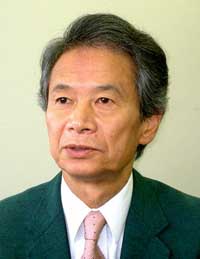Japan's upper house names opposition politician as president
The upper house of Japan's Parliament elected a Democratic Party of Japan lawmaker as its president Tuesday, the first time an opposition member has held the post.

The upper house chose Satsuki Eda in a unanimous vote at the start of a special session following the crushing defeat of Prime Minister Shinzo Abe's ruling party in July 29 elections.
Eda, a former Science and Technology Agency chief, has served three terms in the upper house and four terms in the lower house.
"The makeup of the upper house has drastically changed after the upper house elections," Eda told the parliamentary session. "I think voters' expectations for the upper house are now extremely high."
Abe's Liberal Democratic Party suffered one of its worst setbacks in 50 years of political domination in last month's elections. The Democratic Party advanced to dominate the 242-seat upper house for the first time with 113 seats, according to the latest figures provided by the upper house.
Abe's ruling coalition still controls the more powerful lower house, which chooses the prime minister, but the Democrats' advance in the upper house is expected to make it hard for the ruling bloc to pass legislation, including a bill to extend Japan's support of U.S.-led operations in Afghanistan.
The Democrats have said they would oppose extending past November Japan's military operations in the Indian Ocean to supply fuel for U.S.-led coalition warships. The ruling party wants an extension because terminating the operations could threaten Japan's ties with the United States.
"Be it Afghanistan or Iraq, I don't think Japan-U.S. relations are all about following the Bush administration's policies," Democrat president Ichiro Ozawa said. "So long as we say the Japan-U.S. alliance, we will have to be on equal terms."
Despite sagging popularity and calls for his departure, Abe has refused to step down.
Abe's government has been fiercely criticized over some 50 million missing pension records and the misuse of political funds.
The beleaguered prime minister plans to reshuffle his Cabinet. He has not announced exactly when, but has indicated it will take place after he returns from an Aug. 19-25 trip to South Asia. Japanese media said the reshuffle may take place Aug. 27.
Since Abe took office in September, three Cabinet ministers have resigned and another committed suicide. The agriculture minister resigned amid a funds scandal last week.
Japanese media reported a new scandal Tuesday.
They said Justice Minister Jinen Nagase received 500,000 yen (US$4,200; EUR 3,000) as a political donation from a group for making inquiries to the ministry about getting visas.
The group promotes use of cheap foreign labor in Japan, a practice criticized by a U.S. government report on human trafficking practices, according to the media.
The donation was made before Nagase became justice minister and the money was returned to the group this year, the national newspaper Mainichi reported. Kyodo News agency carried a similar report. Officials at Nagase's office could not immediately confirm the reports.
But Nagase said during a news conference carried by public broadcaster NHK on Tuesday that he didn't know much about the matter.
"I don't think there is anything that would violate the law," he said.
Support for Abe's Cabinet has dipped to a record low of 22 percent, according to a telephone poll of 1,165 voters conducted Aug. 4-5 by the national newspaper Mainichi released Monday.
The special parliament session continues through Friday.
Subscribe to Pravda.Ru Telegram channel, Facebook, RSS!




